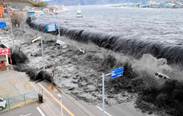A tsunami(海啸) is a series of(一系列) huge waves that can cause great destruction(毁灭) when they hit a beach. Most tsunamis are caused by underwater earthquakes, but not all underwater earthquakes cause tsunamis. About 90 percent of all tsunamis take place in the Pacific Ocean, most of them are in Japan. A strong earthquake in the ocean near Japan caused a deadly tsunami on March 11,2011. As of April 25, the number of death had been raised to 14,133, and more than 13,346 people were listed as missing. The word “tsunami” comes from the Japanese word.

Many tsunamis could be found before they hit land with the use of modern technology. If you see the water drawback (后退) quickly and unexpectedly from a beach, run toward higher ground or inland -- there may be a tsunami coming. Also, if you are on the beach and there is an earthquake, it may have caused a tsunami, so run toward higher ground or inland. The first wave in a tsunami is often not the largest; if you experience one unusually-huge wave, go inland quickly -- even bigger waves could be coming soon.
Do you know the story of the "angel(天使) of the beach"? Tilly, A 10-year-old English schoolgirl who saved the lives of hundreds of people in Phuket,Thailand in the Asian Tsunami of 2004 , by warning them a wall of water was about to strike(袭击), after learning about tsunamis in geography class. “Last term geography teacher Andrew Kearney taught us about earthquakes and how they can cause tsunamis,” Tilly said to the reporter.“I was on the beach and the water started to go funny. There were bubbles and the water went out all of a sudden. I recognised what was happening and had a feeling there was going to be a tsunami. I told mummy.”
小题1:An earthquake may cause a tsunami.
A. in the city B. in the country C. under the water
小题2:When the tsunami is coming, we should .
A. run towards the higher place or inland
B. run to the playground
C.run into a house
小题3:Tilly saved hundreds of people’s life in .
A. Japan B. Tailand C. the United Kingdom
小题4:Tilly recognised there would be a tsunami because .
A. her geography teacher told her.
B. she found the water drawback unusually quickly
C. she had a feeling about the earthquake
小题5:Which of the following statement is TRUE according to the passage?
A. The word “tsunami” is from Japanese because most recorded tsunamis in the world took place in Japan
B. Tsunami can only be found by modern technology before it hit the land.
C. Tsunami only happens in the Pacific Ocean
小题1:C
小题2:A
小题3:B
小题4:B
小题5:A
题目分析:本文介绍的是海啸,海啸是怎样引起的,发生海啸的前兆,发生海啸时应该怎么做。Tilly就根据发生海啸的前兆特征挽救了在泰国普吉岛度假的上千人的生命。
小题1:细节理解题。根据原文Most tsunamis are caused by underwater earthquakes,可知海啸是由于地下水的剧烈震动而引起的。故选C。
小题2:细节理解题。根据原文If you see the water drawback quickly and unexpectedly from a beach, run toward higher ground or inland可知如果遇到海啸,要迅速朝高地跑。故选A。
小题3:细节理解题。根据原文Tilly, A 10-year-old English schoolgirl who saved the lives of hundreds of people in Phuket,Thailand可知Tilly在泰国普吉岛救了上千人的生命。故选B。
小题4:细节理解题。根据原文I was on the beach and the water started to go funny. There were bubbles and the water went out all of a sudden.可知她发现海面有泡沫,海水迅速的退回。故选B。
小题5:细节理解题。根据原文About 90 percent of all tsunamis take place in the Pacific Ocean, most of them are in Japan.及 The word “tsunami” comes from the Japanese word.可知海啸这个词来自日语,因为日本是海啸多发的地区。故选A。
